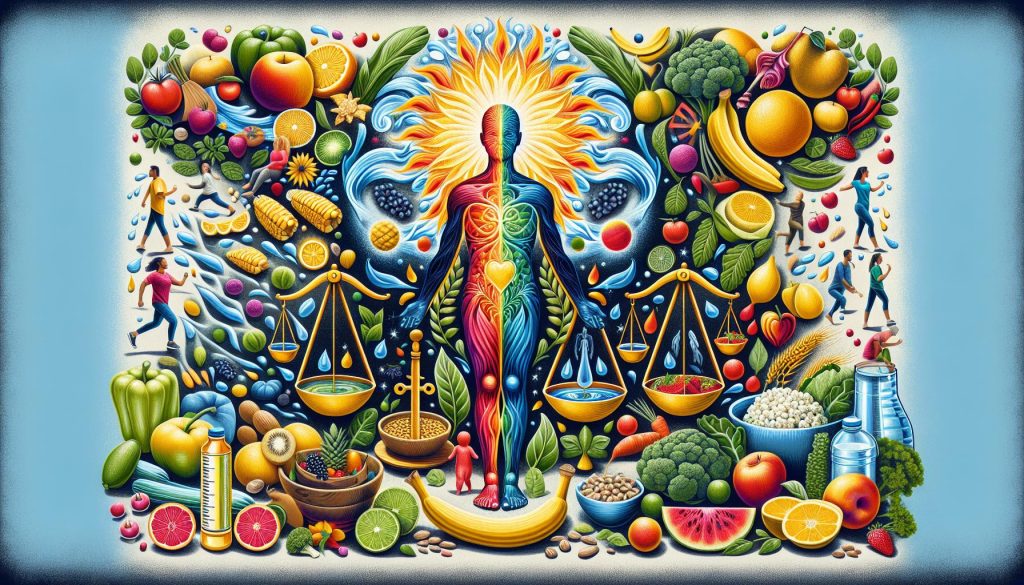
Feeding our Inner Fire: Understanding Energy in the Diet
When it comes to filling our plates, you’ve likely asked yourself, “Where does the energy in the diet come from?” In its simplest form, the answer is food. This includes carbohydrates, fats, proteins – all provide the fuel to keep our bodies running. But like all good stories, there’s more than meets the eye. It’s not just about what we eat, but how our bodies use and store that energy. So, buckle up and join us as we delve into the power of digestion, the efficiency of enzymes, and the magic of metabolism, on this flavourful journey down the dietary energy route.
The Energy Extravaganza: Carbs, Fats and Proteins!
It’s no secret that the food we consume, made up of carbohydrates, proteins, and fats, serve as the primary energy sources for our bodies. Each nutrient plays a unique role in energy production. Carbohydrates, our body’s preferred energy source, fuel everything from your morning jog to meditative breaths. Their simple structure makes them easy to break down and convert into glucose – our bodies’ go-to energy form. Fats, though often given a bad rap, provide us with the highest energy yield per gram. Lastly, proteins, primarily known for their role in tissue repair and immune function, are used for energy when carbohydrates and fats run low.
The Powerhouse: Role of Carbohydrates
It’s hard to ignore the enigma that is carbohydrates. They are our body’s preferred source of energy. They are broken down into glucose, where they either fuel our body’s daily activities, stored as glycogen for later use, or converted into fat, an energy reserve for lean times.
Fuel Reserves: Fats and Proteins
The human body, akin to a well-oiled machine, knows exactly how to optimize energy use. When carbohydrate levels are low, our bodies turn to fats for fuel. Fats, broken down into fatty acids, are energy-dense, providing more ‘bang for your buck’. Protein enters the energy scene only when carbohydrate and fat reserves run low. While it’s not their primary role, they can step up to the plate ensuring our bodies never run on empty.
Fats: The Unsung Heroes
Though frowned upon, fats play a crucial role in energy provision, particularly during periods of fasting or long, low-intensity exercise. In these situations, fats become the stars of the show, taking center stage and working to fuel your body’s functions.
Digestion: Unpicking the Energy Puzzle
Understanding where the energy in your diet comes from requires looking beyond merely what we eat. Those mouth-watering morsels undergo a meticulous process of digestion and absorption. Enzymes act like tiny scissors, cutting the nutrients into smaller pieces, making them easily absorbable and ready to embark on their energy-producing missions.
The Magic of Metabolism
The metabolic pathway, in its brilliant complexity, is the stage where energy extraction takes place. This is where nutrients get broken down into their smallest forms, releasing energy used to make ATP, the body’s energy currency. The sheer efficiency of this process makes our bodies true powerhouses of production!
Conclusion
So, where does the energy in the diet come from? From the food we eat, to the process of digestion, and the marvel of metabolism, our bodies extract and utilize energy in a symphony of processes that work together to keep us running. Energy in the diet is not about consumption alone, but a complex web of processes that transform the food we eat into fuel – the essence of life.
Frequently Asked Questions
1. Why do we need energy from our diet?
Our bodies need energy to function, from powering our muscles for movement to maintaining basic body processes like breathing and thinking. This energy comes from the food we eat.
2. What are the primary sources of energy in the diet?
Carbohydrates, fats, and proteins are the primary energy sources in the diet. Carbohydrates are the body’s preferred energy source, while fats provide the most energy per gram. Proteins provide energy only when carbohydrate and fat levels are low.
3. What is the role of digestion in energy provision?
Digestion breaks down food into smaller, absorbable components. These components are then transported through the blood to cells where they are used for energy.
4. What is metabolism and how does it contribute to energy production?
Metabolism refers to all the chemical reactions in the body that break down nutrients to produce energy. This energy is used to make ATP, the body’s energy currency, which powers all bodily functions.
5. Do different foods provide different amounts of energy?
Yes, different types of food provide varying amounts of energy. Fats provide the most energy per gram, while carbohydrates and proteins provide less. The body retrieves and utilizes these energies differently depending on its immediate and stored energy needs.



